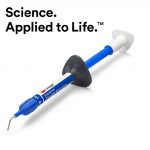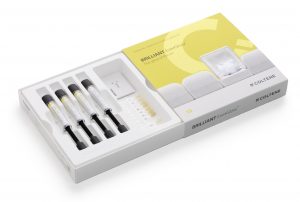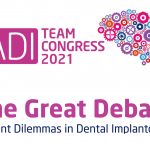Sarah Davies (46) was set to celebrate her 40th birthday when her life took an unexpected turn that would change her life forever.
The wife and mother-of-one from Coventry began to feel some pain in the left side of her gum, just below one of her back teeth. She thought it was just a mouth ulcer, but something was odd about it.
“At first, I didn’t think much of it and carried on with my everyday life,” Sarah says.
“It didn’t feel like a normal mouth ulcer though, sometimes it would send a feeling like an electric shock through the left side of my face.”
One month later, when the pain and inflammation did not go away, Sarah booked an appointment with her dentist.
The dentist treated the tooth above the inflammation with a filling. When the problem continued, Sarah visited another dentist who suspected it was sinusitis.
It would be another nine months, after several dental visits and a last-ditch trip to A&E, that Sarah was finally given the diagnosis of mouth cancer.
Sarah says: “The doctor told me that they had results from my biopsy back and they had found malignant cells. From what they could tell, the tumour was 20mm long and was squished up against the gum.”
Despite several knock-backs, Sarah’s persistence meant that she was able to catch her cancer in the early stages.
This gave Sarah the very best chance of beating the disease.
Sarah received both radiotherapy and chemotherapy and was given the all clear five years ago.
Despite surviving mouth cancer, Sarah continues to live with the after effects that impact her life to this day.
Sarah adds: “Following my treatment, I developed trismus, also called lockjaw, which has impacted my life dramatically. I am only able to open my jaw a matter of millimetres so eating with a knife and fork is tricky and it takes me a long time to eat my meals.
“When going out with friends and family I usually order kids meals so that people aren’t waiting around for too long and if I want a drink, I have to do it through a straw.”
As is common with many mouth cancer survivors, Sarah’s taste buds and salivary glands were also affected, taking some of the joy out of eating and making swallowing more difficult.
Despite the setbacks Sarah has always kept a positive attitude. She admits to still having her down days when she feels frustrated or depressed but her friends, family as well as support from Macmillan nurses keep her going.
Sarah adds: “Some friends have commented that I’m amazing for having the attitude that I have but I don’t think of myself that way. When you’re dealt something, you’ve got to face it. I’ve got an incredible family and friends who’ve supported me through it all.
“The way I look at it is that you’ve got two choices; do what has to be done or give up. Giving up isn’t an option.”
Sarah is sharing her journey to raise awareness during November’s Mouth Cancer Action Month.
The charity campaign, run by the Oral Health Foundation, hopes to encourage more people to be mouthaware by being able to recognise the early signs and symptoms associated with mouth cancer.
Mouth cancer can appear as a long-lasting mouth ulcer that does not go away for three weeks, red or white patches in the mouth, or any lumps and swellings in the head or neck.
During Mouth Cancer Action Month, the Oral Health Foundation and Denplan, part of Simplyhealth, have come together to raise awareness of the disease so that more people can beat it like Sarah.
Sarah admits that her knowledge of mouth cancer was poor before her diagnosis and hopes to inspire more people to learn about the disease, so they can spot it early.
Sarah says: “I didn’t really know about mouth cancer until I had it. Then I started to look into it and realised just how many people it does impact. I will do anything to help make more people aware because the sooner mouth cancer is treated, the better your chances.
“If you think something isn’t right in your mouth then go and get it checked out. It probably is nothing to worry about but it’s important you don’t ignore it. I would also say that if you aren’t satisfied with the diagnosis you receive then go get a second opinion from another dentist or doctor.”
Catherine Rutland, Clinical Director at Denplan, part of Simplyhealth, agrees and also notes how catching mouth cancer early can greatly increase your chances of survival and a better quality of life.
Dr Rutland says: “If mouth cancer is spotted early, the chances of a complete cure are good. Around 2,702 people in the United Kingdom lose their life to mouth cancer every year. That’s seven people every day. It is widely recognised that many of these deaths could be prevented by early diagnosis. Early detection is by far the most important factor, as the stage at which mouth cancer is diagnosed has the most significant effect on overall survival as mouth (and throat) cancer can grow very quickly.
“Encouraging patients to attend regular dental examinations, carry out self-checks, and become familiar with the normal state of their mouth (and head and neck) is very important. To help raise patient awareness of the signs and symptoms of mouth cancer, the Oral Health Foundation have developed a range of excellent patient education resources available on their website.”
Most mouth cancer appear on the tongue or tonsils, but it can also occur on the lips, gums, roof and floor of the mouth.
Last year, new mouth cancer cases in the UK reached a record high of 8,722 – an increase of 97% compared to 20 years ago.
The key to beating mouth cancer is spotting it early. If you notice any of the symptoms associated with mouth cancer, visit a dentist or doctor immediately.
For more information about mouth cancer, including how to do a self-check for the disease, visit www.mouthcancer.org.











 Minimally invasive options arguably offer more value that certain other treatments and therefore, going forward, they are also a better use of your practice’s precious resources.
Minimally invasive options arguably offer more value that certain other treatments and therefore, going forward, they are also a better use of your practice’s precious resources. 



